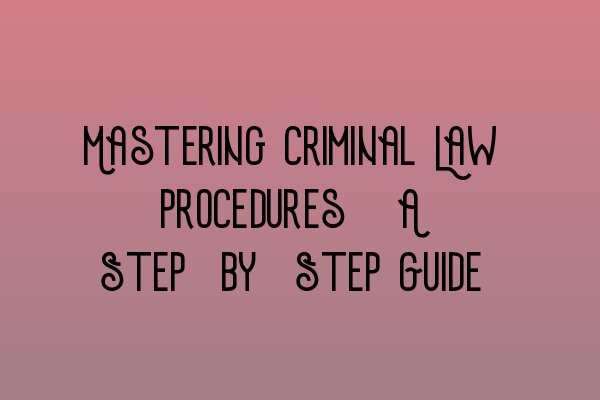Mastering Criminal Law Procedures: A Step-by-Step Guide
Welcome to SQE Criminal Law & Practice Law UK! In this blog post, we will provide you with a comprehensive guide on mastering criminal law procedures. Whether you are a law student, aspiring solicitor, or even a practicing lawyer looking to brush up on your knowledge, this step-by-step guide will ensure that you have a solid understanding of criminal law procedures.
The Basics: Understanding Criminal Law Procedures
Before diving into the step-by-step process, it’s essential to have a solid understanding of criminal law procedures. Criminal law procedures refer to the legal framework and processes followed when dealing with criminal offenses. These procedures aim to protect the rights of individuals accused of crimes while ensuring justice is upheld.
Now, let’s move on to the step-by-step guide on mastering criminal law procedures.
Step 1: Understanding Criminal Offenses
The first step in mastering criminal law procedures is to understand the different types of criminal offenses. Criminal offenses can vary from minor infractions to serious felonies. It’s crucial to familiarize yourself with the elements of each offense to determine the appropriate legal procedure to follow.
For more information on the essentials of consideration in contracts, check out our article on Essentials of Consideration: Understanding the Backbone of Contracts. Don’t forget to bookmark it for future reference!
Step 2: Reporting and Investigation
Once a criminal offense is identified, the next step is reporting and investigation. This involves gathering evidence, interviewing witnesses, and conducting forensic analysis. Proper documentation and adherence to legal procedures is crucial to ensure a fair and unbiased investigation.
Step 3: Arrest and Charging
After a thorough investigation, if there is sufficient evidence, the suspect will be arrested and charged with the criminal offense. During this stage, it’s important to ensure that the arrest is made in accordance with all legal requirements and that the suspect’s rights are protected.
Step 4: Bail and Pre-trial Proceedings
Following the arrest, the court will determine whether the suspect can be released on bail or must remain in custody until the trial. Pre-trial proceedings may include arraignment, plea bargaining, and setting a trial date. It’s essential to understand the nuances of these proceedings to effectively represent your client’s interests.
To gain a deeper understanding of express and implied terms in contracts, read our article on Express and Implied Terms in Contracts: Decoding Agreement Components.
Step 5: Trial and Sentencing
The trial is the culmination of the criminal law procedure. During the trial, evidence will be presented, witnesses will be examined and cross-examined, and legal arguments will be made. Following the trial, the court will deliver a verdict and impose a suitable sentence if the defendant is found guilty.
Step 6: Appeals and Post-trial Proceedings
In some cases, the defendant may choose to appeal the verdict or sentence. Appeals and post-trial proceedings involve a review of the original trial’s legal and factual elements. These proceedings require a thorough understanding of procedural rules and persuasive legal arguments.
To explore more about the strategies to study contract law effectively, check out our article on Strategies to Study Contract Law Effectively: Maximizing Your Learning Potential. It provides valuable insights that will enhance your learning approach.
Final Thoughts
Mastering criminal law procedures is essential for any aspiring criminal lawyer. By following this step-by-step guide, you can develop a solid foundation of knowledge that will enable you to navigate the intricacies of criminal law with confidence.
If you’re interested in learning more about assignment of contracts, rights, obligations, and legal considerations, our article on Assignment of Contracts: Rights, Obligations, and Legal Considerations is a must-read!
Remember, practice and continuous learning are key to mastering criminal law procedures. Stay updated with the latest legal developments and precedents to provide the best legal representation to your clients.
